Subscribe now to get notified about IU Jharkhand journal updates!
Enablers & Challenges in the adoption of E-Cars: A Customers perspective with reference to Agra City
Background: The automobile Industry, is witnessing new changes and one such change is of introduction of Electronic Vehicles (EVs). EVs refer to all those vehicles (2-wheelers, 3-wheelers, and 4-wheelers that require the support of Electricity for working and smooth functioning. This research paper has highlighted and analyzed the enablers and challenges in the adoption of Electric Cars with reference to Agra City. The literature reviewed by the researchers did not cover/give emphasis on the enablers and challenges, with respect to the adoption of E-Cars from the perspective of Customers. The Government of India especially the Automobile Dealers is now focusing on more and more production of E-Vehicles, (one of such Vehicles being E-Car) and also spreading more and more awareness regarding the importance of E-Vehicles. Besides this, the literature reviewed by the researchers did not focus anywhere on the challenges faced by the customers before purchasing Electric Car
Aims and objectives: To study the enablers in the adoption of E-Cars from the perspective of Customers and To study the challenges faced in the adoption of E-Cars from the perspective of Customers
Materials and Methods: The researchers selected 20 target respondents in Agra owing E-Cars with whom the questionnaires were shared. In this study, Descriptive Statistics and Inferential Statistics have been used to analyze the data. The software used by the researchers for Data Analysis were IBM-SPSS and MS-Excel.
Results: It was found that lower registration Fees are the most significant enabler in purchasing an E-Car & Price is the most significant challenge faced in purchasing an E-Car.
Keywords :
E-scooters, E-Bikes, E-Cars, E-Vehicles, Challenges, EnablersIntroduction
Someone has rightly said, that, “Change is Inevitable”. We can see and witness the same in every field and the same goes for Automobiles. All vehicles—two-wheelers, three-wheelers, and four-wheelers—that depend on electricity for proper operation are referred to as electronic vehicles or E-Vehicles. The two-wheeled electric vehicles are e-scooters and e-bikes. Whereas the range of Electric 4-wheelers is restricted to E-Cars, the range of Electric 3-wheelers is limited to only E-Rickshaws. Over time, there has been a steady rise in the awareness of electric vehicles in India. This has led to a rise in the daily demand and adoption of EVs, with the Indian government and media playing a major role in this process. Indian automakers are now developing e-vehicles, such as the TATA Tiago.
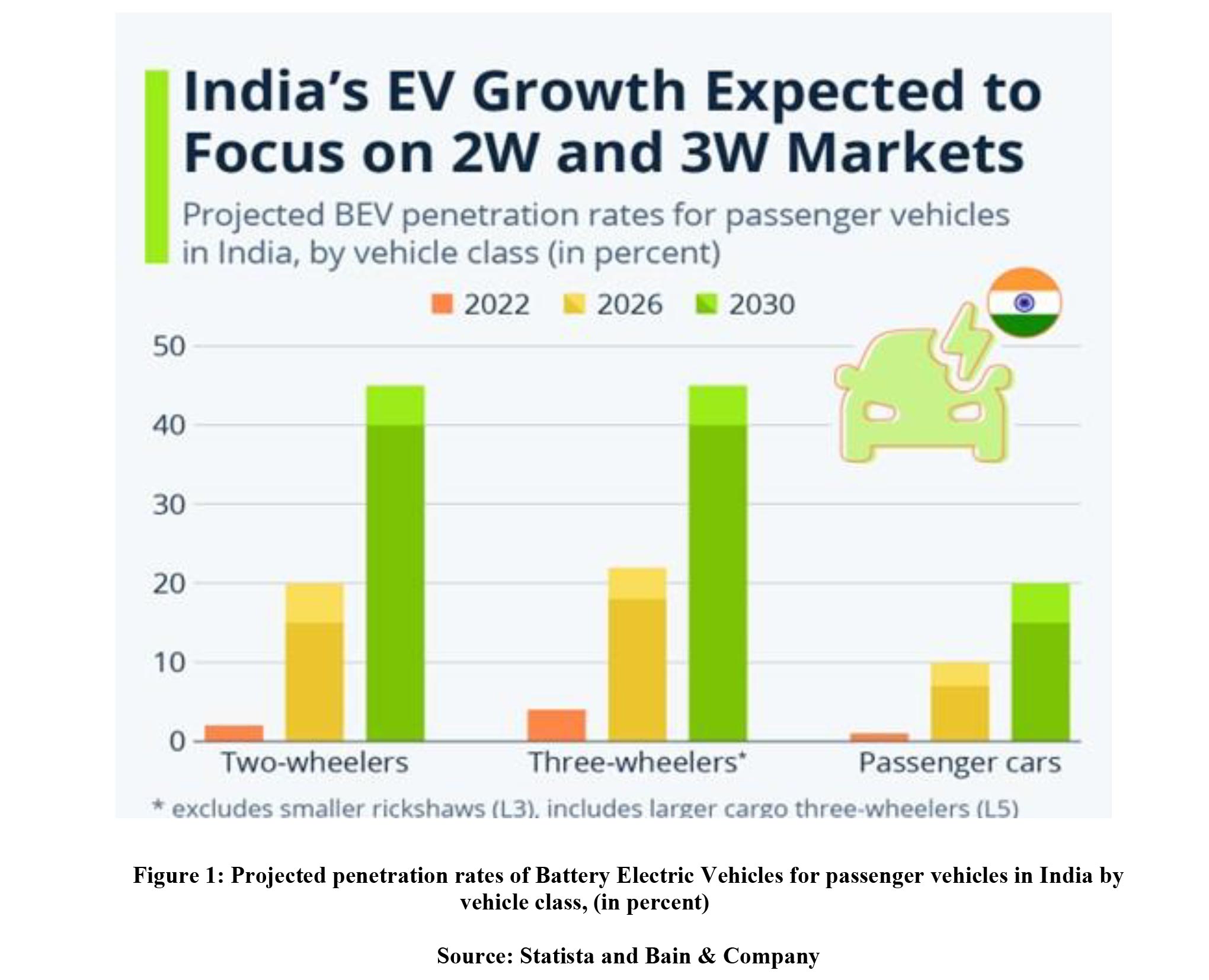
Like any other vehicle, when a customer purchases an E-Car, there are various factors that affect his decision-making process, which has been discussed in this research in the form of Enablers & Challenges. Openness to new experiences, price consciousness, self-environmental concern, esteem, and social effect were the most substantial predictors of EV purchasing motive. (Cui et al. (2021)). While reducing operating expenses is the main driver for early adopters in Korea, the bulk of Chinese
3
buyers were swayed to purchase an electric vehicle by environmental concerns. (Chu W, et al. (2019))
Studies on Factors affecting the purchase aims of E-Vehicles of Customers
A theoretical framework was developed to identify the key variables influencing customers' choices to purchase EVs on the basis of the “Technology Acceptance Model” (TAM), “Innovation Diffusion Theory” (IDT), and “Theories of Planned Behavior” (TPB). (Tu & Yang (2019)). Demographic factors have a substantial effect on customers' goal of purchasing EVs in Beijing, whereas subjective standards and non-monetary incentive policies do not have a notable influence on consumers' intentions to purchase EVs in Beijing. The attitudes of customers toward buying electric vehicles in Beijing are significantly positively influenced by policy measures related to monetary incentives, product perception, cognitive status, and perceived behaviour control. (Huang & Ge (2019)). Price consciousness, self-esteem, social influence, environmental concern as well as openness to new experiences are the most substantial predictors of EV purchasing motives. (Cui et al. (2021)). (He et al. (2017)) investigated how consumer perception and personality affect or influence their propensity to purchase EVs using a well-established personality-perception-desire paradigm. Customers' attitudes, which are influenced by various factors such as perceived benefit (both positive and negative), new product knowledge (both positive and indirect), perceived risk (both positive and negative), and brand trust (both positive and indirect), are the main determinant of their goal to purchase EVs. (Yang et al. (2020)). Consumers' aims to purchase electric automobiles are positively and significantly affected by a variety of factors, including their attitude, perception of value, assignment of responsibility, perceived consumer efficacy, subjective and personal norms, and understanding of the implications (Asadi et al. (2021)). Zhang et al. (2018) demonstrated the manner in which consumers' objectives for purchasing electric vehicles are influenced by motivation and perceptions. Shalender & Sharma (2020) predicted the adoption intention of 326 customers with respect to EV purchases using an extended TPB model. Speed, environmental concern, charging infrastructure, and
Price differences all have a major effect on the decision to buy an EV. Swaroop et al. (2022). examined the behavioral aim to adopt EVs in India and the implications of financial incentive schemes, perceived value, personal norms, and perceived behavioral control. Additionally, it validated how real use affects sustainability aspects including perceived impacts on the economy, society, and environment. Soodan & Saha (2023). designed to predict the intentions of Indian consumers to purchase electric cars. Two elements of the TPB model—attitude and subjective norms—in conjunction with two modified constructs—openness to experience and environmental concern—significantly explained the desire to buy an EV. Perceived behavioral control, or PBC, was shown to be minimal. Mishra & Malhotra (2019) aimed to assess the many factors influencing the inclination of Indians to buy EVs by presenting a utility theory-based model that combines psychological and economic aspects. The study examined the impacts of performance features, environmental concerns, financial rewards, ownership cost,
4
infrastructure support, and social influence on Indian customers' purchase intention towards EVs using confirmatory factor analysis in AMOS version 25. According to the report, environmental concerns and performance characteristics are the 2 primary factors affecting Indian consumers' decisions to buy EVs. Gurudath & Rani. (2021) The study's objective was to draw attention to how crucial it is to match buying intentions with crucial marketing variables that affect the purchase of EVs. According to the study, the majority of people planning to buy electric cars were men; the Hyundai Kona and TATA Nexon had the highest brand awareness among these cars; product reviews and advertisements were the main ways to spread the word about these cars; and factors like safety, service warranties, price, lifespan, speed, and pick-up were considered to be very important when buying an electric car. When it comes to electric cars, elements like the test drive, low noise, trend, delivery time, and product upgrade were seen to be critical. Low noise levels, modern technology, and environmental friendliness were considered to be very satisfying features of electric
Studies on factors Affecting the rate of adoption of E-vehicles
Reducing operating expenses is the main driver for early adopters in Korea, whereas the bulk of Chinese buyers are influenced to purchase an EV by environmental concerns. (Chu W et al. (2019)).
Tiwari et al. (2023) examined how financial incentive schemes, subjective norms, perceived value, personal norms, and perceived behavioral control affected the behavioral intention to adopt EVs in India. It also confirmed how real-world use affected sustainability dimensions like perceived effects on the environment, society, and economy. The study found that while the financial incentive policy had little effect, personal norms had a good impact on behavioral intention to embrace e-vehicles. The study validated the theoretical efforts of TPB and NAM (Norm Activation Theory) to arrive at a comprehensive model because of the complex links between numerous socio-psychological elements and the purchase of e-vehicles. Das & Bhatt (2022) designed to compile a summary of the policies pertaining to electric vehicles that the Indian federal and state governments have implemented to assess the impact, relationship, and applicability of these regulations on the nation's adoption of EVs. Campisia et al. (2022) provided a descriptive statistical analysis in two dimensions to determine the acceptability of shared e-mobility connected to the user’s profile.
Other Studies
Haustein & Jensen (2018) contrasted the socio-demographic, attitudinal, and mobility habits of users of conventional vehicles (CVs) and battery electric vehicle (BEV) users.
Meisel & Merfeld (2018). recommended monetary rewards for services related to electric vehicle ownership.
Kumar & Rana (2023) discussed the prospects and challenges that India's battery-switching stations face. The study concluded that EV customers would prefer the idea of battery swapping stations given the current situation of EVs in India. With the ongoing improvements in quick charging technology, the increasing range of electric vehicles, and the slowing rate at which EV batteries charge, battery swapping may prove to be a successful strategy in the long run, or it may eventually become outdated. It's feasible that commercial electric vehicles will eventually find success with battery swapping as a business model.
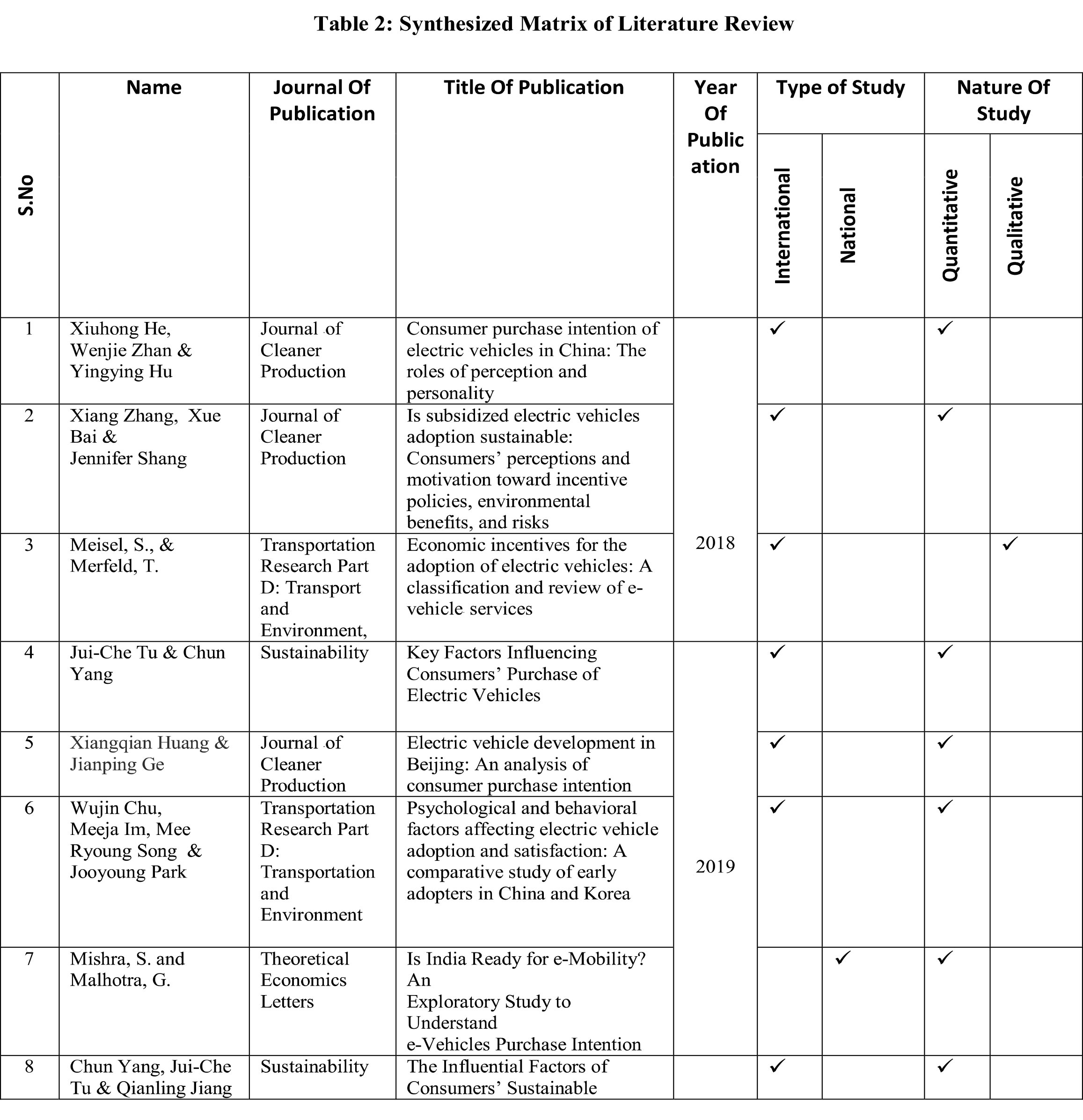
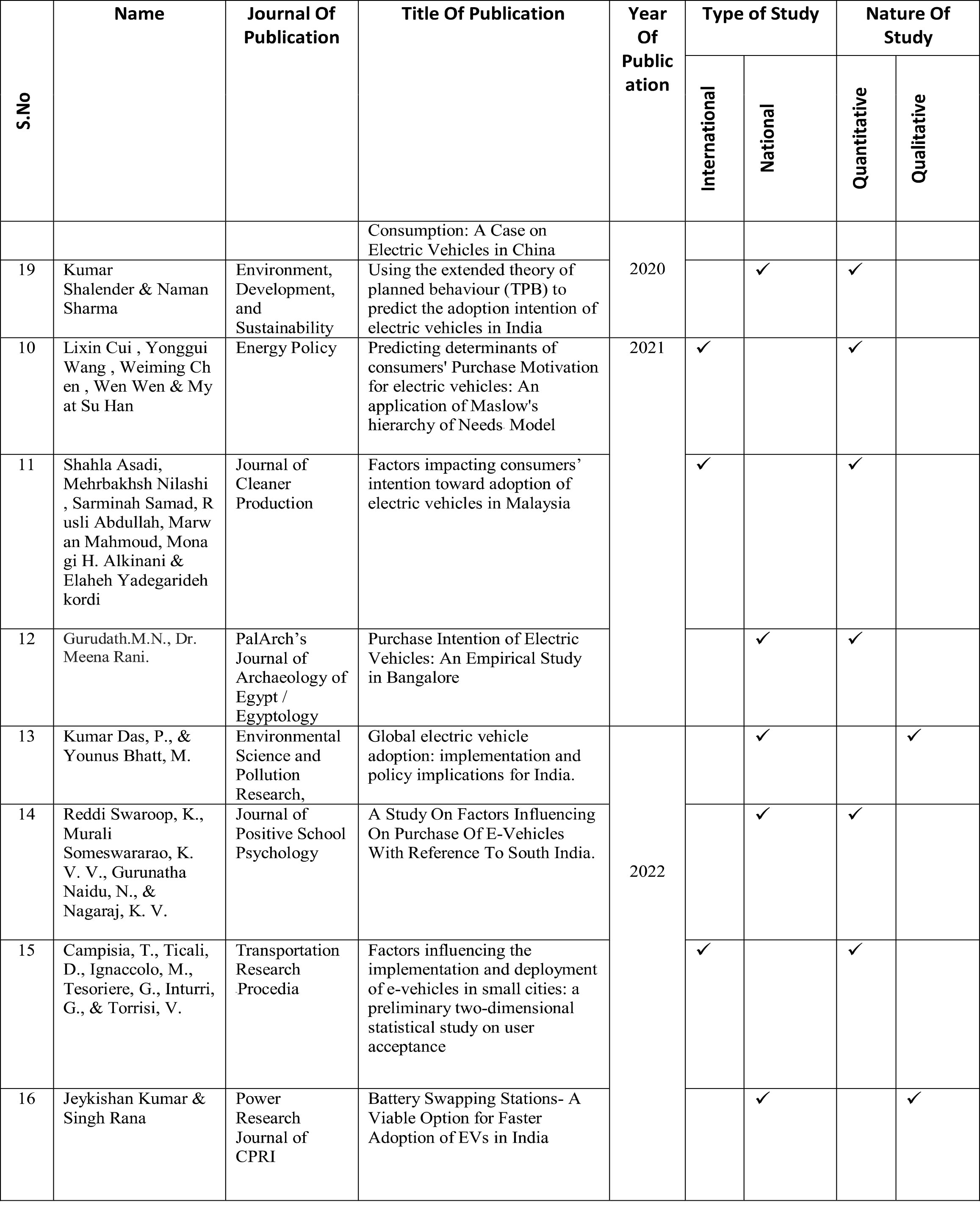
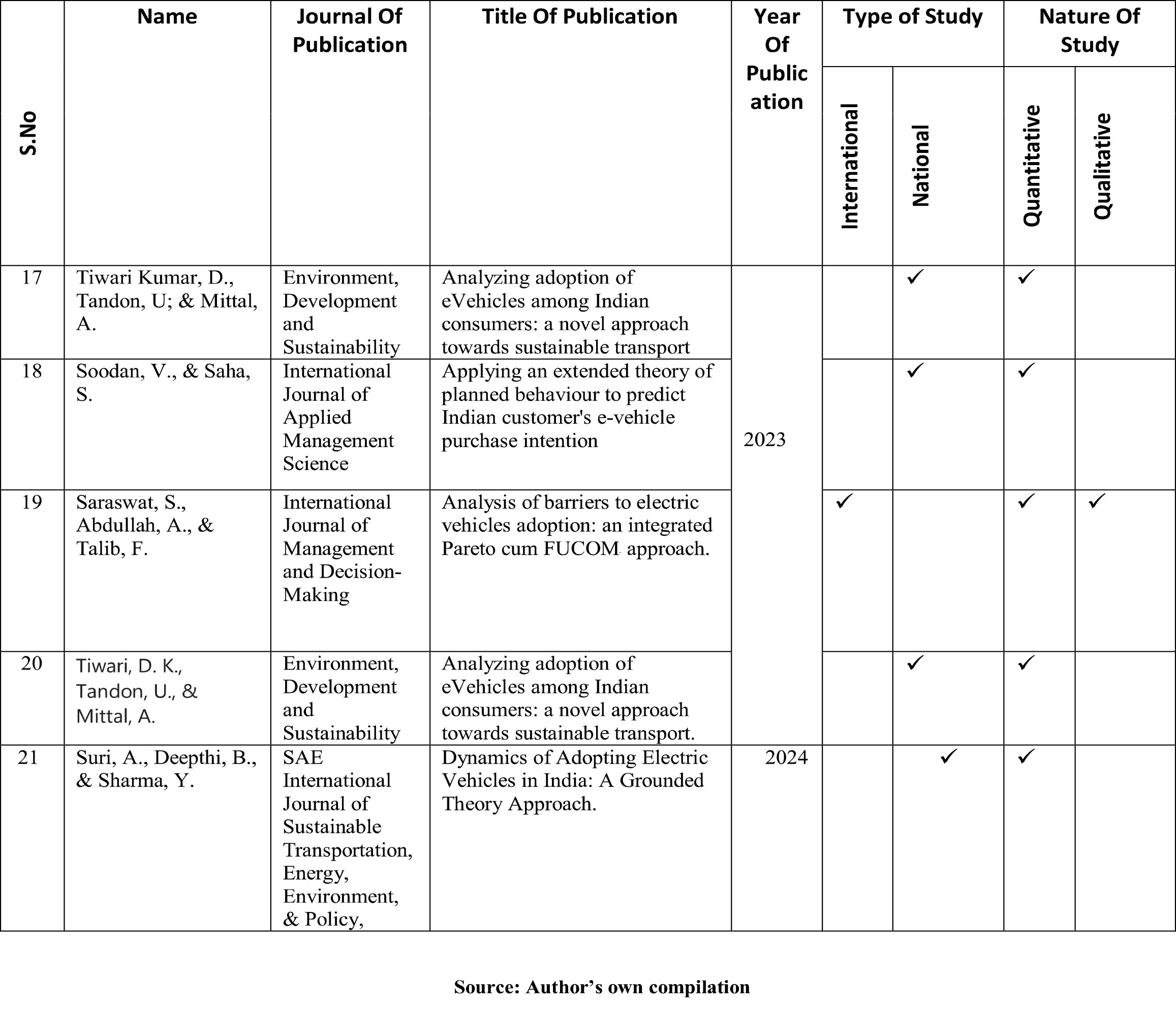
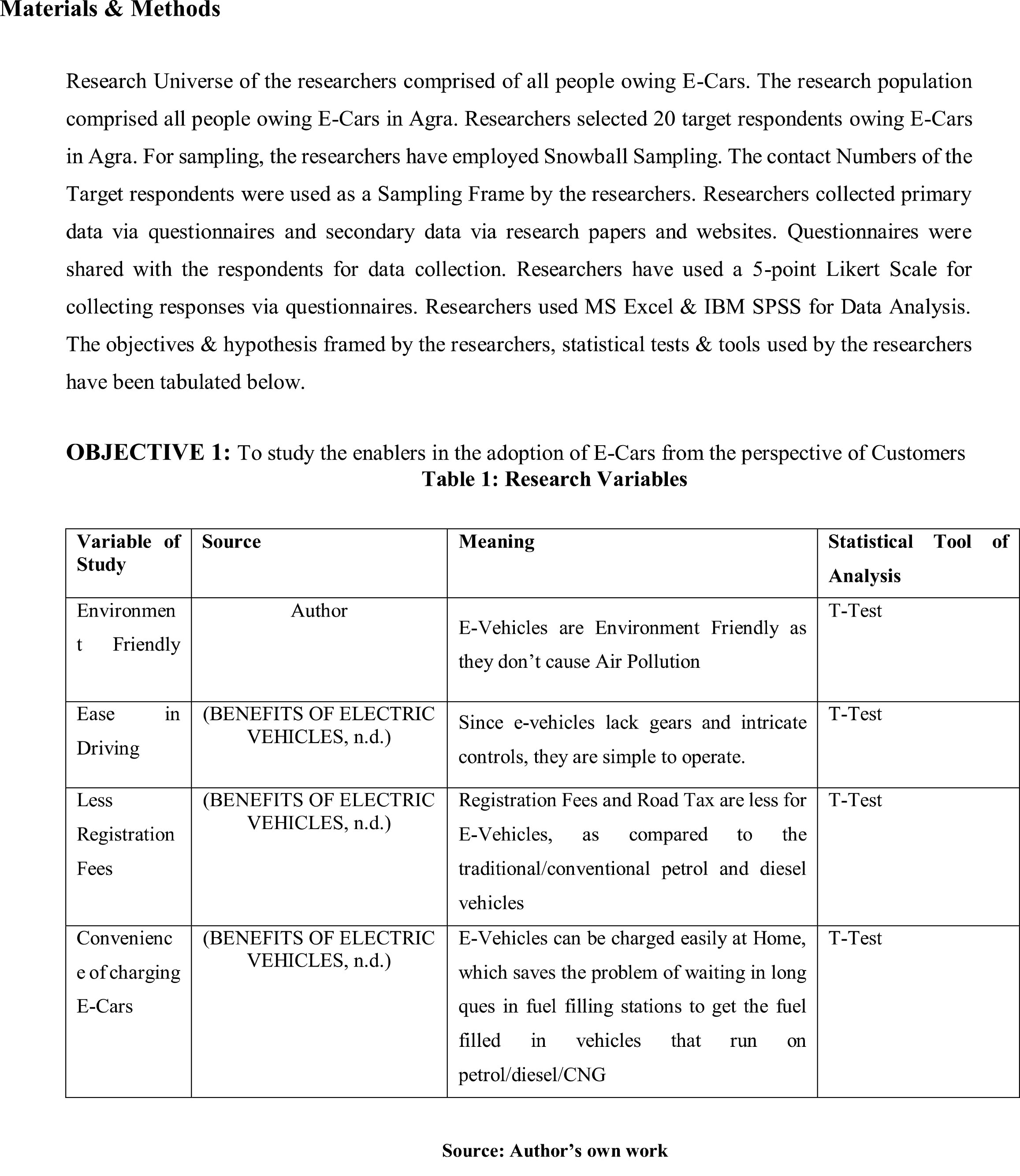
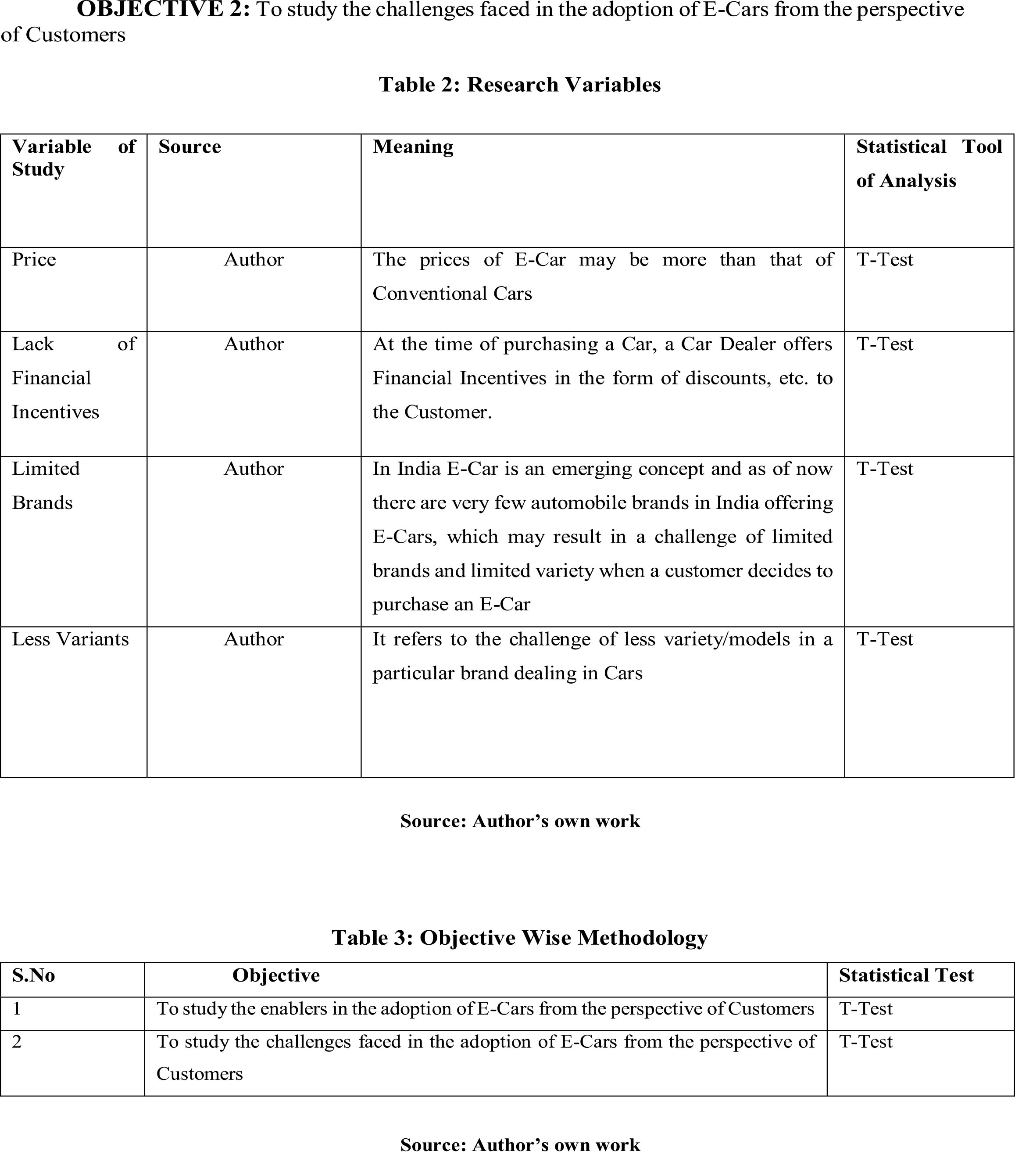
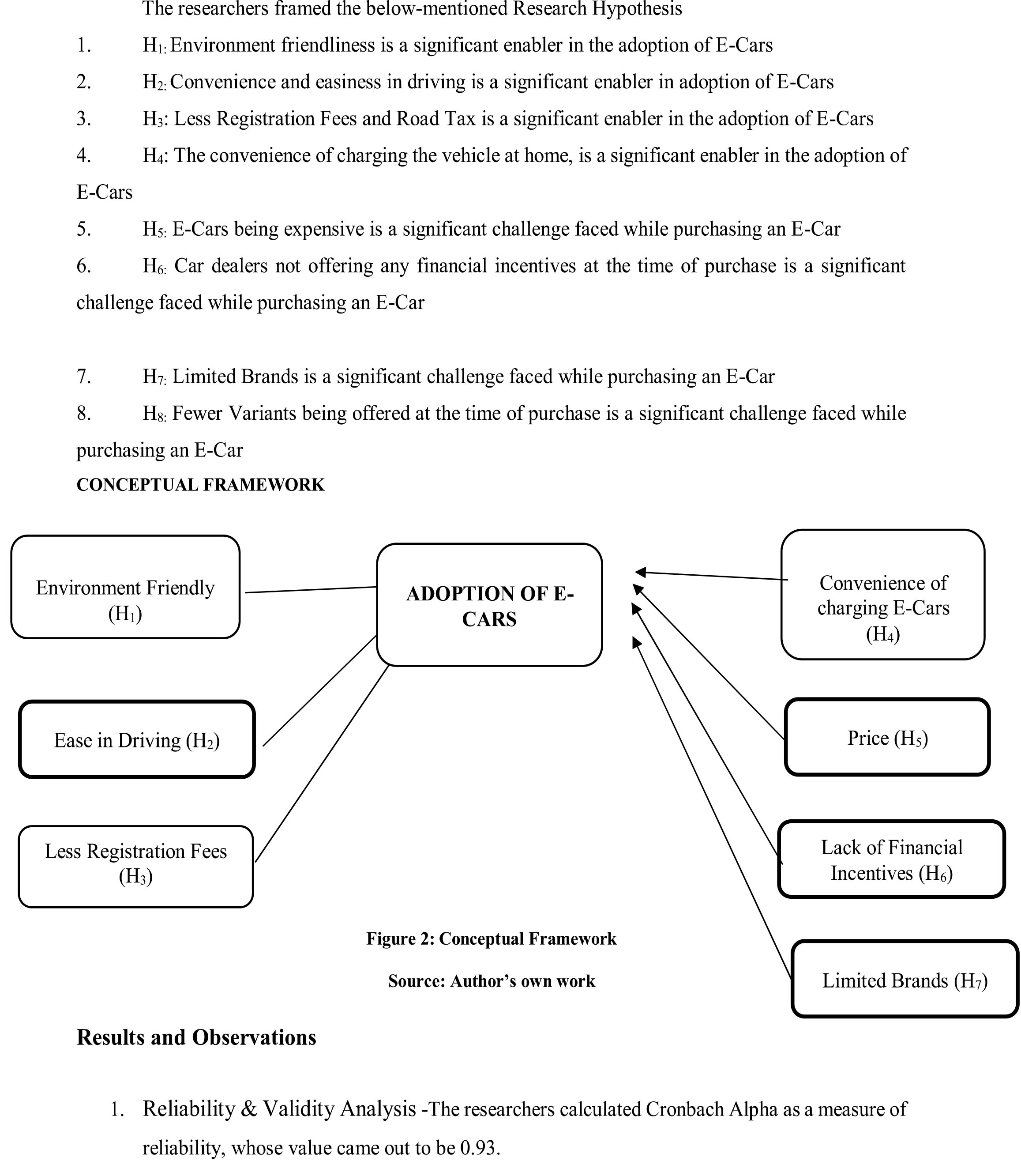
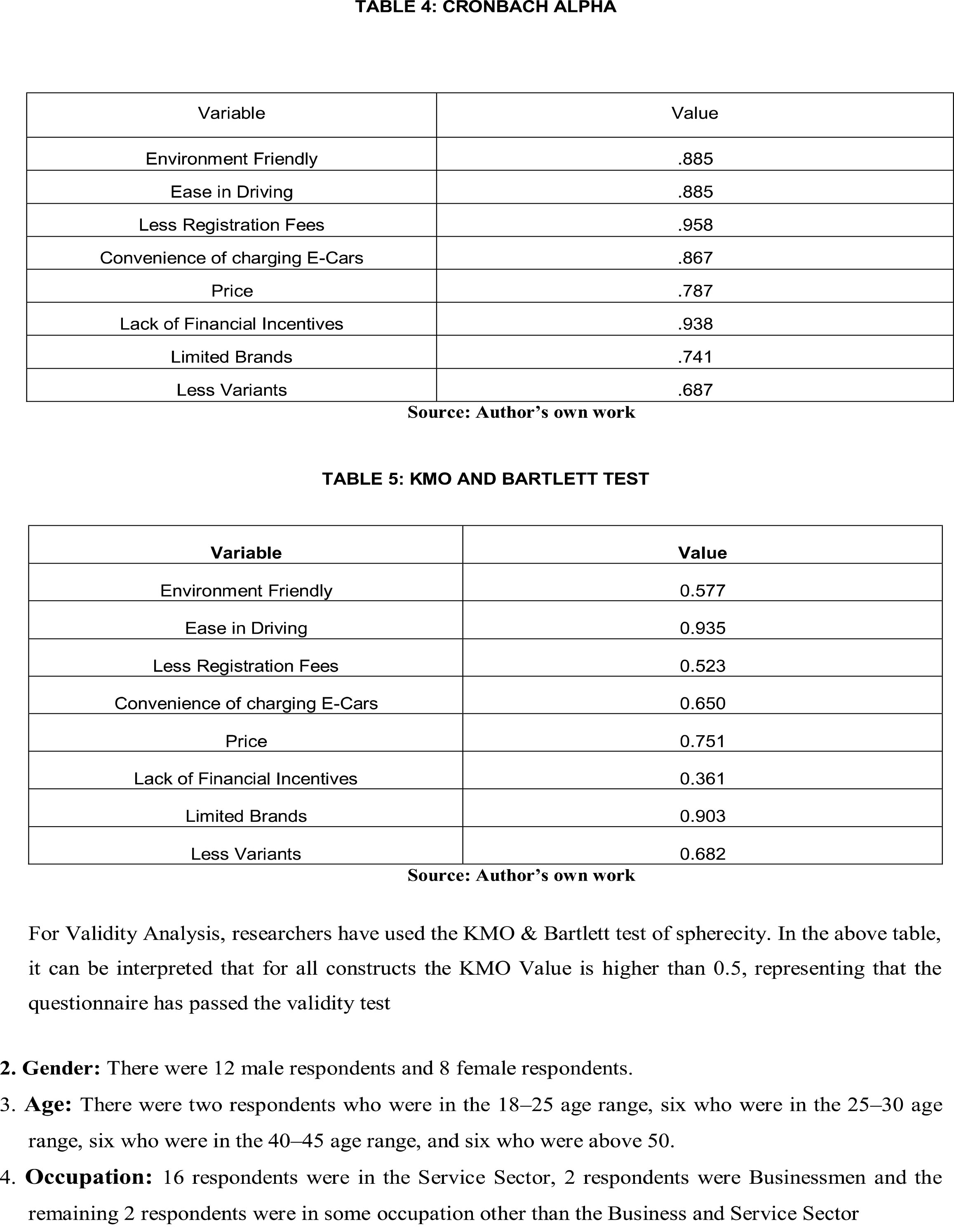
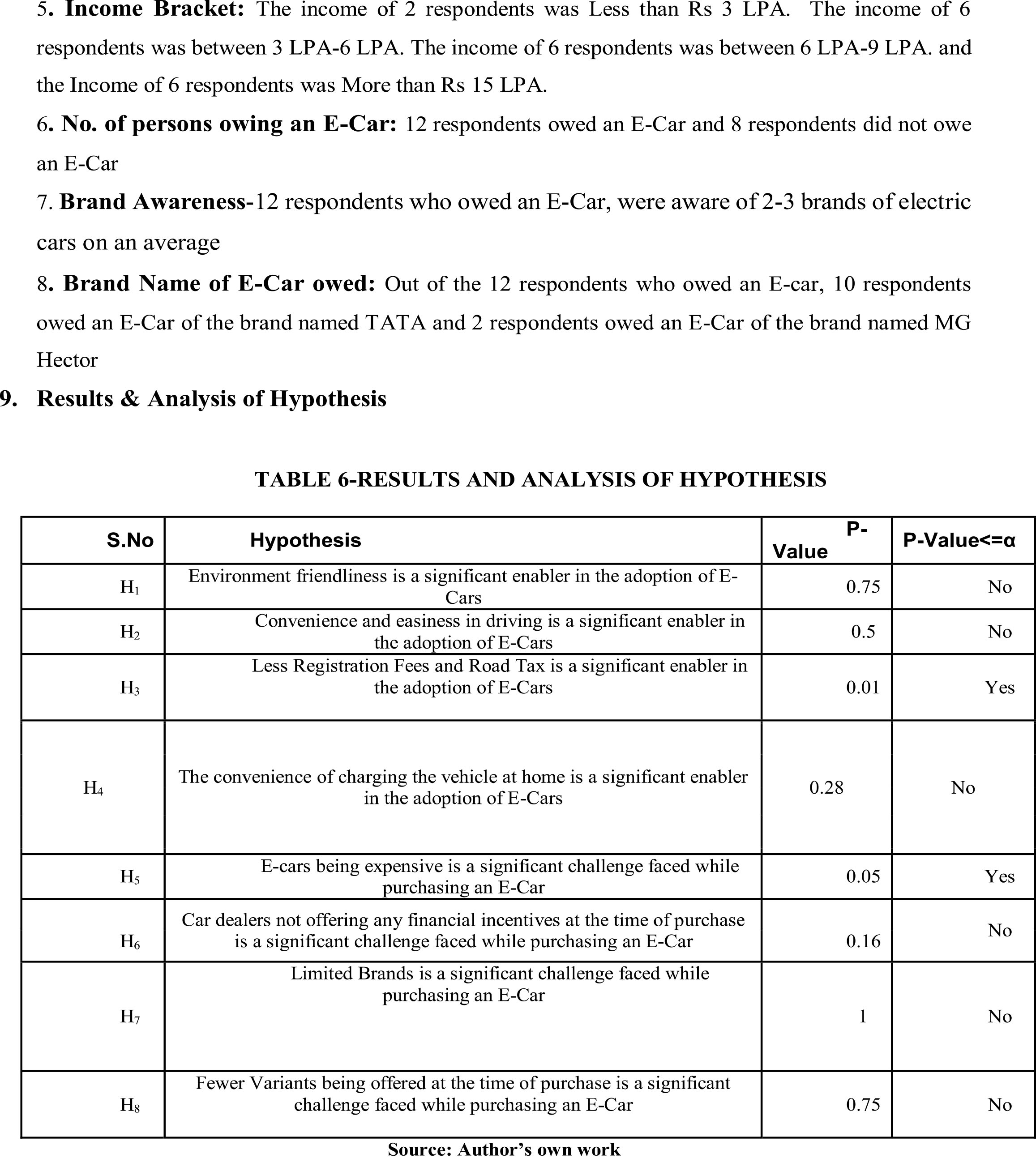 Conclusion
Conclusion
Out of the below-mentioned enablers:
- Environment Friendly
- Ease in Driving
- Less Registration Fees
- Convenience of charging E-Cars
Less Registration Fees is the most significant enabler of purchasing an E-Car
AND
2. Out of the below-mentioned challenges:
- Price
- Lack of Financial Incentives
- Limited Brands
- Less Variants
Price is the most significant challenge faced in purchasing an E-Car
3. In India there is a variety of brands in E-Cars, but unfortunately, the respondents are aware of only 2-3 brands on average. Therefore, the Government and the Car Dealers dealing in E-Cars shall try to increase the visibility of their brands through various channels, viz: Newspapers, Internet, Banners, Pamphlets, etc.
ABBREVIATIONS
- E-Cars: Electric/Electronic Cars
- E-Vehicle: Electric/Electronic Vehicle
- EV: Electric/Electronic Vehicle
ACKNOWLEDGEMENT
The researcher would like to thank all the respondents for sparing their valuable time and filling up the questionnaires
FUNDING
The researchers have not received/taken funds from any authorities
COMPETING INTERESTS
None
REFERENCES
Research Papers:
- Tu,J; & Yang C. (2019) Key Factors Influencing Consumers’ Purchase of Electric Vehicles. Sustainability.;11(14):22 pages. https://doi.org/10.3390/su11143863
- Huang X & Ge J. (2019) Electric vehicle development in Beijing: An analysis of consumer purchase intention. Journal of Cleaner Production.;216:361-372. https://doi.org/10.1016/j.jclepro.2019.01.231
- Cui L, Wang Y, Chen W, Wen W & Han M,S. (2021) Predicting determinants of consumers’ purchase motivation for electric vehicles: An application of Maslow’s hierarchy of needs model. Energy Policy.;151. https://doi.org/10.1016/j.enpol.2021.112167
- Haustein S; & Jensen A,F.. (2018) Factors of electric vehicle adoption: A comparison of conventional and electric car users based on an extended theory of planned behavior. International Journal of Sustainable Transportation.;12(7):1-13. https://doi.org/10.1080/15568318.2017.1398790
- He X; Zhan W; & Hu Y. (2017) Consumer purchase intention of electric vehicles in China: The roles of perception and personality. Journal of Cleaner Production.;204:1060-1069. https://doi.org/10.016/j.jclepro.2018.08.260
- Yang C; Tu J.C; & Jiang Q. (2020) The Influential Factors of Consumers’ Sustainable Consumption: A Case on Electric Vehicles in China. Sustainability.;12(8):16 pages. https://doi.org/10.3390/su12083496.
- Asadi S,; Nilashi M; Samad S; Abdullah, R; Mahmoud, M; Alkinani, M;H; & Yadegaridehkordi E. (2021) Factors impacting consumers’ intention toward adoption of electric vehicles in Malaysia. Journal of Cleaner Production. 2021;282. https://doi.org/10.1016/j.jclepro.2020.124474
- Chu, W; Im, M; Song, M.R; & Park, J (2019) Psychological and behavioral factors affecting electric vehicle adoption and satisfaction: A comparative study of early adopters in China and Korea. Transportation Research Part D:Transportation and Environment.;76:1-18. https://doi.org/10.1016/j.trd.2019.09.009
- Zhang X; Bai X; & Shang J. (2018) Is subsidized electric vehicles adoption sustainable: Consumers’ perceptions and motivation toward incentive policies, environmental benefits, and risks. Journal of Cleaner Production.;192:71-79. https://doi.org/10.1016/j.jclepro.2018.04.252.
- Shalender, K; & Sharma, N; (2020) Using extended theory of planned behaviour (TPB) to predict adoption intention of electric vehicles in India. Environment, Development and Sustainanbility.;23:665-681. https://doi.org/10.1007/s10668-020-00602-7
- Das, P.K; & Bhatt, M.N; (2022). Global electric vehicle adoption: implementation and policy implications for India. Environmental Science and Pollution Research, 29, 40612–40622. https://doi.org/10. 1007/s11356-021-18211-w
- Swaroop, K.R; Someswararao, K.V.V.M; Naidu, N,G; & Nagaraj, K. V; (2022). A Study On Factors Influencing On Purchase Of E-Vehicles With Reference To South India. Journal of Positive School Psychology, 6(11), 200–208.
- Campisia, T., Ticali, D., Ignaccolo, M., Tesoriere, G., Inturri, G., & Torrisi, V. (2022). Factors influencing the implementation and deployment of e-vehicles in small cities: a preliminary two-dimensional statistical study on user acceptance. 24th Euro Working Group on Transportation Meeting. https://doi.org/10.1016/j.trpro.2022.02.042
- Tiwari, D.K; Tandon, U., & Mittal, A. (2023). Analysing adoption of eVehicles among Indian consumers: a novel approach towards sustainable transport. Environment, Development and Sustainability, 27 pages. https://doi.org/10.1007/s10668-023-03587-1
- Soodan, V., & Saha, S. (2023). Applying an extended theory of planned behaviour to predict Indian customer’s e-vehicle purchase intention. International Journal of Applied Management Science, 15(3), 258-276. https://doi.org/10.1504/IJAMS.2023.133670
- Meisel, S., & Merfeld, T. (2018). Economic incentives for the adoption of electric vehicles: A classification and review of e-vehicle services. Transportation Research Part D: Transport and Environment, 65, 264–287. https://doi.org/10. 1016/j.trd.2018.08.014
- Jeykishan Kumar, K., & Singh Rana, K. (2023). Battery Swapping Stations- A Viable Option for Faster Adoption of EVs in India. Power Research - a Journal of CPRI, 18(2), 171–177. https://doi.org/10.33686/pwj.v18i2.1107
- Mishra, S. and Malhotra, G. (2019) Is India Ready for e-Mobility? An Exploratory Study to Understand e-Vehicles Purchase Intention. Theoretical Economics Letters, 9, 376-391. https://doi.org.10.4236/tel.2019.92027
- Gurudath & Rani (2021) Purchase Intention of Electric Vehicles: An Empirical Study in Bangalore. PalArch’s Journal of Archaeology of Egypt / Egyptology, 18(1), 4826-4839. Websites:
- Buchholz, K. (2023, January 11). India's EV Growth Expected to Focus on 2W and 3W Markets. Statista. https://www.statista.com/chart/29091/india-ev-by-vehicle-type/
- Labs, S. (2023, March 31). Benefits and Challenges of Electric Vehicles. LinkedIN. https://www.linkedin.com/pulse/benefits-challenges-electric-vehicles-scrrum
- BENEFITS OF ELECTRIC VEHICLES. (n.d.). Retrieved from https://e-amrit.niti.gov.in/benefits-of-electric-vehicles
